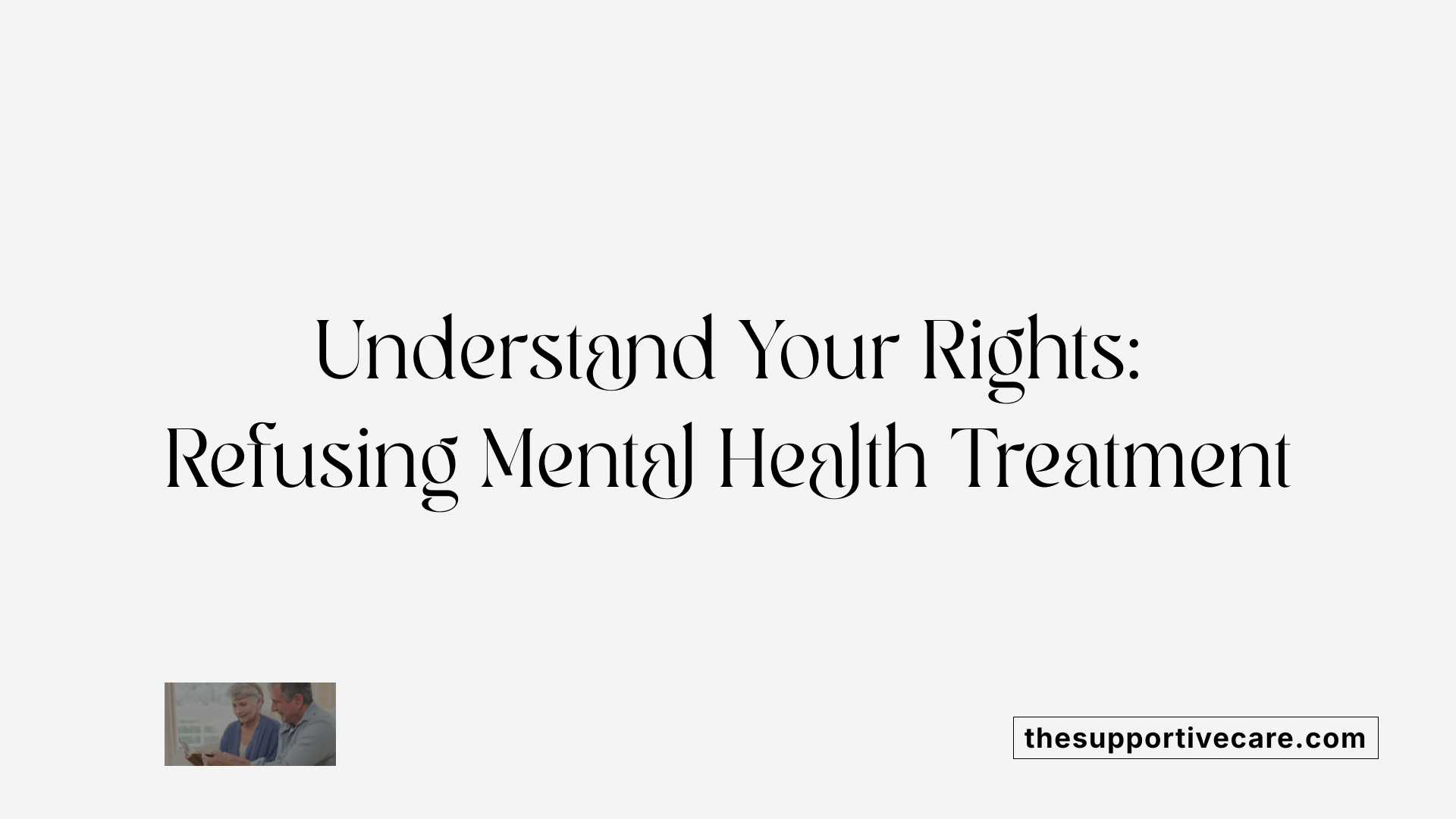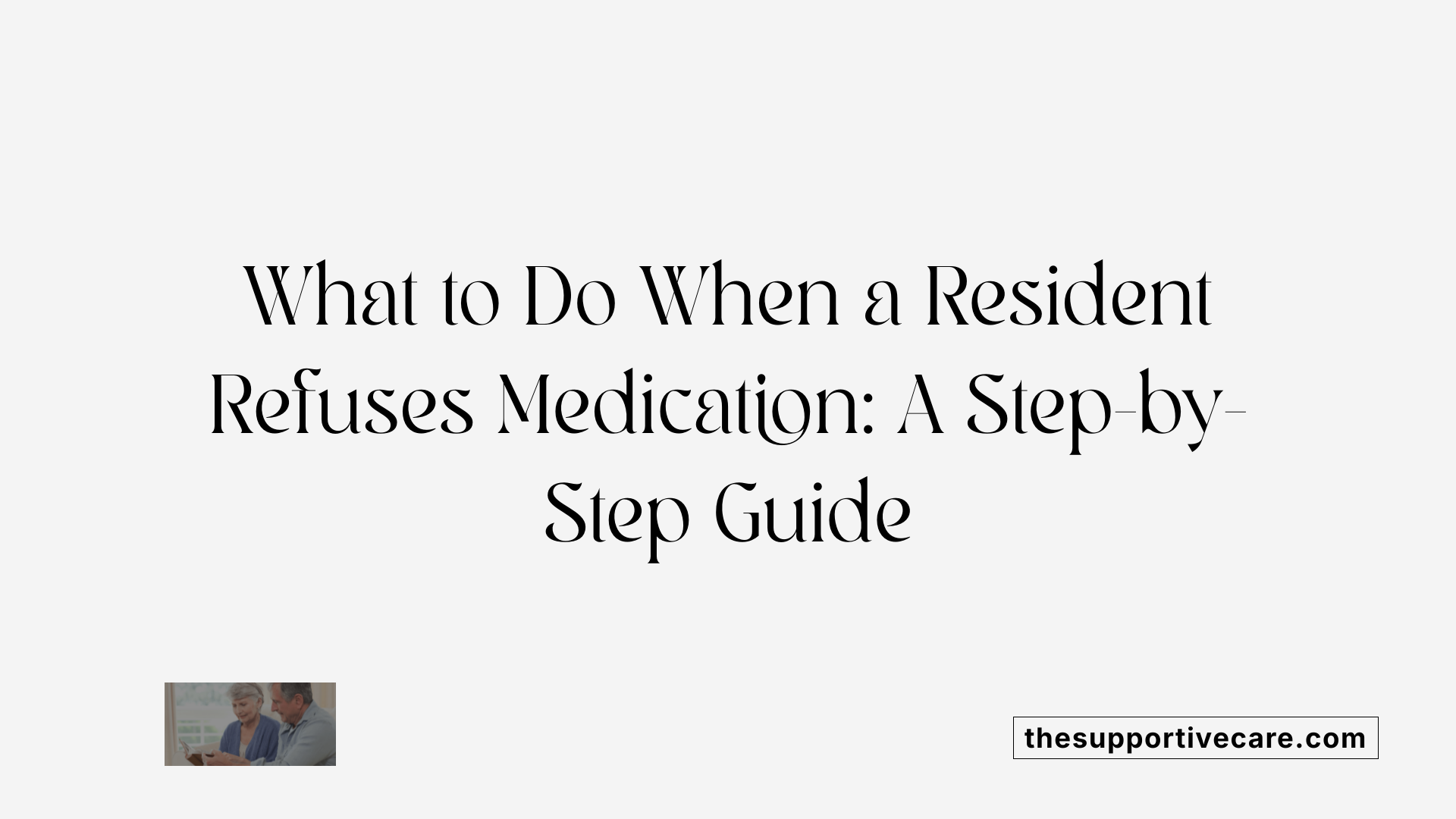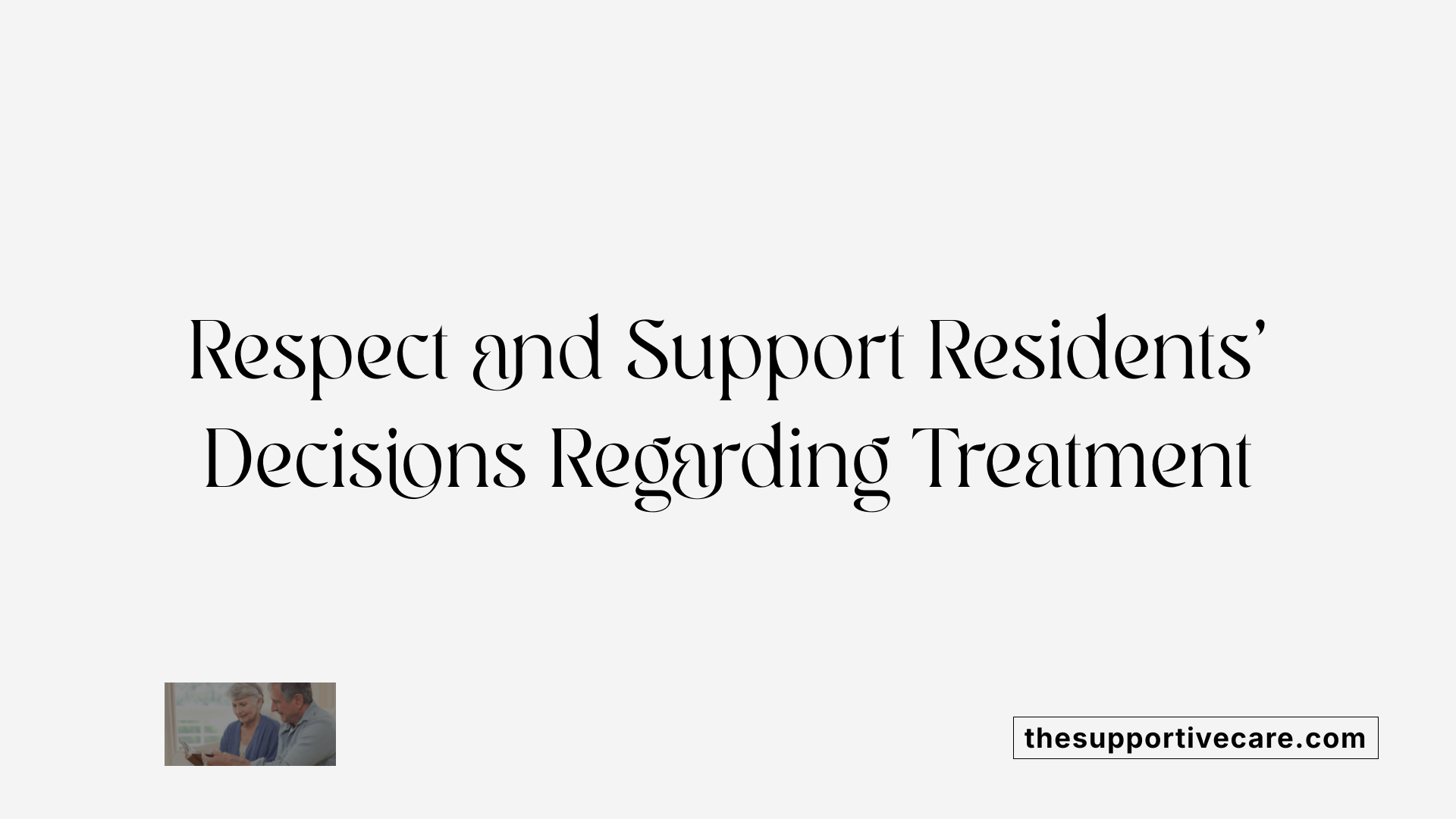Navigating Residents’ Rights and Legal Boundaries
Managing residents' refusal of mental health treatment in assisted living facilities requires a delicate balance of respecting individual autonomy while ensuring safety and compliance with legal standards. This article explores the rights residents hold, the procedures staff must follow, and resources available to manage refusals ethically and legally.
Residents’ Rights Regarding Refusal of Mental Health Treatment

What are residents' rights regarding refusal of mental health treatment in assisted living?
Residents in assisted living facilities generally have the fundamental right to refuse mental health treatment. This includes medication, therapy, and other interventions aimed at managing mental health conditions.
The law emphasizes residents' autonomy to make their own health decisions. When residents choose to refuse treatment, they must be provided with comprehensive information about the possible medical, health-related, or psychological consequences of their decision. This ensures they can make an informed choice.
Participation in care planning is a critical aspect of respecting residents’ rights. Residents have the opportunity to discuss, recommend modifications, and be involved in developing their care plans. This collaborative approach helps ensure that their personal preferences and needs are prioritized.
However, limitations exist when a resident is deemed legally incompetent or if their refusal of treatment poses a safety risk. In cases where mental capacity is questioned, a formal assessment by qualified professionals may be required.
Legal restrictions come into play primarily when a resident’s refusal might endanger themselves or others. Under such circumstances, legal interventions—such as court orders or guardianship—may be pursued to ensure safety.
Despite these restrictions, facilities are bound to respect residents’ core rights and must balance safety concerns with individual autonomy. Residents can also exercise their right to appeal treatment decisions or potential eviction actions based on refusal of care. Ultimately, the goal is to uphold dignity, safety, and respect for personal choice within the legal framework.
Procedural Steps When a Resident Refuses Psychiatric Medication

What procedures should be followed when a resident refuses prescribed psychiatric medication?
When a resident refuses prescribed psychiatric medication, it is vital for staff to approach the situation with sensitivity and care. The initial step involves gentle questioning to understand the resident's reasons for refusal. Staff should actively listen and consider factors such as potential side effects, the taste of medication, difficulty swallowing, or cultural beliefs influencing their decision.
A thorough assessment of the resident’s capacity to make informed choices is essential. If the individual is evaluated as competent, their decision to refuse treatment must be respected, aligning with their legal rights. Conversely, if there is doubt about their capacity—especially in cases involving cognitive impairments—an evaluation by a qualified healthcare professional should be conducted.
Supporting the resident includes employing strategies like re-offering the medication at different times, adjusting the form (such as switching from pills to liquids), or exploring alternative administration methods. Documenting the refusal meticulously and noting any concerns or observations is crucial for maintaining accurate medical records.
Effective communication between the resident, their family, and healthcare providers helps in addressing any underlying issues related to the refusal. Collaboration may lead to finding acceptable alternatives or solutions that respect the resident's autonomy while ensuring their safety.
In situations where disagreements about medication refusal cannot be resolved locally, involving an ethics consultation or legal procedures might be necessary. This ensures that the resident’s rights are upheld within the framework of legal and ethical standards, and their well-being remains a priority.
Supporting Residents’ Objections to Treatment

How can assisted living facilities handle objections to treatment while respecting residents' rights?
Assisted living facilities are committed to respecting residents' rights, including the right to refuse medical treatment. Handling objections effectively involves a combination of clear communication, cultural sensitivity, and a thorough understanding of legal and ethical boundaries.
First, staff should ensure that communication is open, respectful, and tailored to each resident’s cultural and language needs. This means explaining medical options, potential outcomes, and the reasons for treatments clearly, allowing residents to make informed decisions.
Involving residents in decision-making is crucial. Early and ongoing discussions—called advance care planning—help establish residents' preferences and values regarding their treatment. When appropriate, family members or legally appointed surrogate decision-makers are engaged to support the resident’s choices.
Recognizing the influence of social and familial relationships can help staff address concerns and support autonomy. Building trust through respectful interactions enables residents to express their views freely and confidently.
Legal boundaries restrict involuntary treatment to situations where refusal poses imminent risk to life or health or endangers others. In such cases, facilities must follow strict procedures, including legal assessments and documentation. Ethical considerations emphasize respecting autonomy while ensuring safety.
Interdisciplinary teams, including social workers, chaplains, and healthcare professionals, are valuable resources. They can mediate conflicts, clarify misunderstandings, and help residents navigate difficult decisions.
Ultimately, by combining respectful communication, resident participation, awareness of legal limits, and professional support, assisted living facilities can uphold residents’ rights and dignity—even when treatment refusals are involved.
Actions for Staff and Available Resources When Residents Refuse Treatment

What actions should staff take when a resident refuses mental health treatment, and what resources are available?
When a resident chooses to refuse mental health treatment, staff must approach the situation with respect, sensitivity, and adherence to legal rights. The first step is to thoroughly document the refusal in detail, noting the resident’s words, behavior, and any observed reasons for declining care. It’s essential to assess whether the refusal is influenced by misunderstandings, fears, or other concerns and to explore these issues through open, respectful communication.
Staff should involve the resident in discussions about their care plan, ensuring they understand the consequences of refusing treatment. They should also consult with mental health professionals or social services when appropriate to evaluate the resident’s mental capacity and explore alternative supportive options. Respecting a resident’s right to refuse is crucial, provided the decision is informed, voluntary, and not harming others.
Legal and regulatory frameworks, such as CMS regulations and OBRA guidelines, emphasize resident autonomy while safeguarding safety. Staff should be familiar with these standards to ensure compliant care and rights protection.
Resources to support staff include legal guidance documents, resident advocates, and ombudsman services that can mediate disputes or misunderstandings. Mental health agencies specializing in elder care can provide additional assessments or counseling services. Facility compliance officers can help interpret policies and ensure proper procedures are followed.
Ultimately, prioritized actions involve transparent communication, thorough documentation, multidisciplinary collaboration, and upholding residents’ rights to refuse treatment, all within the scope of legal and ethical standards. This approach promotes person-centered care and supports residents’ dignity and autonomy.
Legal Protections for Residents Who Refuse Mental Health Treatment
What legal protections exist for residents who refuse mental health treatment in assisted living?
Residents in assisted living facilities retain fundamental rights that protect their autonomy and dignity, even when they decline mental health treatment. These rights include the ability to provide informed consent, ensuring they understand the potential consequences of refusing care.
Legal statutes such as the Americans with Disabilities Act and specific mental health laws safeguard residents from discrimination and unjust treatment. These laws affirm that refusal of treatment alone should not lead to discrimination or wrongful discharge.
In cases involving mental health concerns, laws like the Baker Act outline procedures for involuntary commitment. This law permits treatment without consent only if the individual poses a risk to themselves or others. The process includes strict safeguards, such as assessments by qualified professionals, detailed documentation, and the resident’s right to appeal.
Residents also have the right to actively participate in their care planning. They can discuss treatment options, voice concerns, and seek modifications aligned with their preferences. Access to medical records, grievance procedures, and advocacy support ensure residents’ voices are heard.
When safety is at risk, legal procedures may allow for court-ordered intervention. However, these are reserved for emergency situations and require compliance with legal standards designed to protect individual rights.
Overall, legal protections aim to strike a balance between ensuring safety and respecting personal liberty. They uphold residents’ rights to refuse treatment unless their refusal endangers themselves or others, and proper legal channels are followed to support necessary interventions.
Legal Frameworks Governing Involuntary Treatment and Transfers
Can residents be involuntarily committed or forced to undergo treatment in assisted living?
In assisted living and long-term care facilities, involuntary commitment or forcing treatment is tightly regulated by specific state laws and procedures, such as the Baker Act in Florida.
These laws set strict conditions under which involuntary treatment can occur. Typically, a resident can only be committed if they are deemed mentally ill, pose a danger to themselves or others, and lack the capacity to make informed decisions about their care.
Facilities must follow detailed protocols before initiating any involuntary intervention. This includes conducting thorough assessments, documenting the resident's condition, and obtaining court orders when necessary.
Involuntary treatment usually involves assessments by qualified mental health professionals, and families or guardians are notified as part of the process. Proper transportation procedures, including law enforcement or emergency medical services, must be followed during psychiatric evaluations.
Residents maintain rights to fair hearings and legal representation. If a resident is found competent, they can refuse treatment even if they have a mental health diagnosis.
Legal protections prevent facilities from forcibly administering treatment without adherence to these legal processes. While involuntary treatment can be necessary for individuals with severe mental health issues, its use in assisted living is limited and controlled to ensure residents’ rights are protected.
The balance between safety and personal autonomy is upheld through these laws, ensuring that involuntary commitments are used appropriately and with respect to residents’ legal rights.
Ensuring Residents’ Rights During Treatment Refusal Without Compromising Safety
How can assisted living facilities ensure residents' rights are upheld during treatment refusal without compromising safety?
Assisted living facilities are committed to respecting residents’ rights, including the right to refuse medical treatment. To do so effectively, they must first assess each resident's capacity to make informed decisions. This involves evaluating whether residents understand the nature and consequences of refusing care, using clear communication and thorough documentation.
Staff members from front-line caregivers to management teams play vital roles in safeguarding these rights. They often engage in multidisciplinary teamwork, consulting healthcare professionals, social workers, and legal advisors when necessary. This collaborative approach helps balance individual autonomy with safety considerations.
When a resident's capacity is uncertain or compromised, the facility must involve legally authorized proxies or guardians to ensure decisions honor the resident's preferences and rights. Policies should promote evidence-based risk assessments to determine when safety concerns justify interventions.
In situations where immediate action is essential, facilities can resort to the least-restrictive measures possible. For example, if a resident refuses medication but is at risk of severe health deterioration, involuntary hospitalization might be ethically justified. Such measures should always aim to preserve dignity, involve residents in decision-making whenever feasible, and be used only when necessary to protect their well-being.
Upholding Rights While Ensuring Resident Well-being
Residents’ rights to refuse mental health treatment are protected by law, but managing refusals requires careful, ethically informed procedures. Facilities must assess capacity, communicate clearly, document decisions thoroughly, and engage legal resources when necessary. Collaboration with mental health professionals, residents, families, and advocacy organizations ensures a respectful approach that balances individual autonomy with safety and care standards, preventing unlawful evictions and protecting residents from neglect or misuse of legal interventions.
References
- 25 Common Nursing Home Problems—& How to Resolve Them
- Can a Nursing Home Evict a Resident for Refusing Medical ...
- [PDF] Your Rights and Protections as a Nursing Home Resident - CMS
- Long-Term Care Residents' Rights - California Department of Aging
- [PDF] Minnesota Bill of Rights for Assisted Living Residents
- [PDF] Exercising Your Rights as an Assisted Living Facility Resident
- Assisted Living for Adults Who Have a Mental Illness - A Place for Mom
- [PDF] Long-Term Care Facilities
- Consumer Guide: Problems with Nursing Homes, Residential Care ...
- Residents' Rights | NCDHHS



































































































